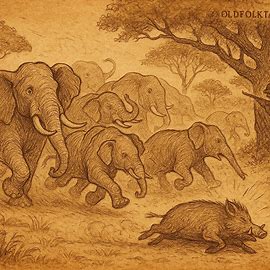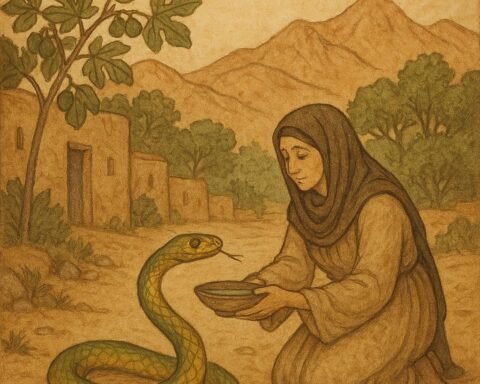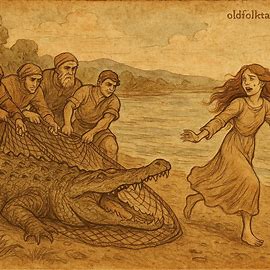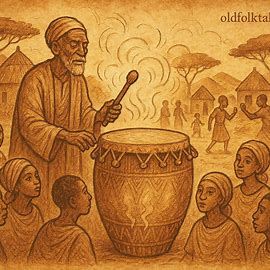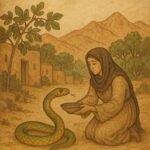Once upon a time, in the dense forests of Eritrea where shadows of tall trees stretched long across the earth, a wandering boar found himself in the company of a mighty herd of elephants. The ground beneath their massive feet trembled as they moved, their trunks swaying with unbothered grace. The boar, however, was not interested in their majesty or their size. He was hungry, and so, lowering his head, he dug into the soft earth, rooting around for food while the elephants grazed peacefully nearby.
The air that day was heavy with silence, broken only by the rustle of leaves and the occasional trumpet of the elephants. Yet, hidden among the thickets, danger was watching. A hunter, armed with his musket, crept toward the herd, his eyes fixed greedily on the largest male elephant. The hunter raised his weapon, steadying his breath, and with a sharp crack, the shot rang through the forest.
The elephants, startled, stamped and shook the earth with thunderous steps. But the bullet, meant for one of them, missed its mark. Instead, it pierced the unsuspecting boar, striking him down where he stood. The great herd recoiled, some trumpeting in alarm, others crashing into the brush to escape what they thought was an assault upon them.
The boar, bleeding and trembling, turned his eyes toward the elephants and cried out: “Am I struck, elephants? Of all of you, why should it be me?” His voice carried bitterness, not at the elephants, but at the cruel hand of chance. For he had not been the hunter’s target, yet his body bore the punishment.
READ THIS: The Council of the Mice: An Eritrean Folktale That Teaches Lessons on Courage and Caution
The elephants, shaken but unharmed, looked upon him in silence. None could answer his question, for none among them could explain the mystery of fate. The boar struggled for breath, his life fading swiftly. With his last strength, he muttered words that would live on long after his body had fallen: “It is an accident, said the boar, though he was struck in the midst of elephants.”
The herd, realizing that death had claimed him, fled deeper into the forest, leaving the lifeless boar where he had fallen. And so it was that this tale became a proverb, spoken whenever misfortune befalls someone despite their safety in the company of many: “It is an accident, said the boar; in the midst of a herd of elephants, he was struck.”
Moral Lesson
This tale reminds us that life’s blows are not always distributed by reason or fairness. The boar’s fate illustrates how chance and circumstance can single out the innocent while sparing the many. Misfortune, like the hunter’s bullet, does not always strike where it is aimed, nor does it always punish the guilty.
From this, we learn the humbling truth that no amount of numbers, strength, or company can always shield us from fate. Sometimes, destiny unfolds in ways that defy logic. The proverb reminds us to meet such moments not with bitterness, but with the wisdom to accept that life’s course often lies beyond our control.
Knowledge Check
Who were the main characters in the tale?
The boar, the herd of elephants, and the hunter.
Why was the boar struck instead of the elephant?
The hunter’s bullet missed its intended target and accidentally struck the boar.
What question did the boar ask after being struck?
He asked why, out of all the elephants, he was the one struck.
What proverb arose from this tale?
“It is an accident, said the boar; in the midst of a herd of elephants, he was struck.”
What lesson does this Eritrean folktale teach?
That fate and misfortune can strike unexpectedly, regardless of fairness or numbers.
What cultural origin does this tale belong to?
Tigrean/Eritrean folktale.
Source: Tigrean folktale, Eritrea.
